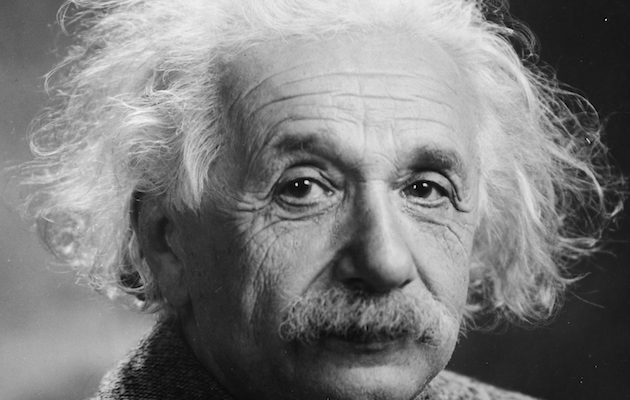In the science vs faith debate, each side seems oblivious to the quotes opposing its views, which allows the “ping-pong quote” to go on forever.
 Albert Einstein. / Wikimedia Commons
Albert Einstein. / Wikimedia Commons
Almost everyone wants to have Albert Einstein on his/her side, which is quite understandable. And the science/faith debate is no exception. Quotes abound, not always authentic and seemingly contradictory, fired by each camp at the other. Of course, each side seems oblivious to the quotes opposing its views, which allows the “ping-pong quote” to keep on forever.
A book published by Princeton Press in 2010 may help. The Ultimate Quotable Einstein is the fourth edition of a collection of all the quotes Princeton’ people could gather on a variety of topics. Einstein stayed at the Princeton’s “Institute for Advanced Studies” from 1933 to his death in 1955, so it’s a good place to look for 1st or 2nd hand witnesses. The book has been compiled by Alice Calaprice, a German born expert on Einstein who’s been living in Princeton since the 1970 [1], when she started to work on the topic.
What do we find as “God quotes”? Here are few showing what Einstein was and wasn’t. It seems he doesn’t easily fit in any camp. I reproduce the references as they appear in the book. Some quotes are double edge, so I mention them twice. There are more quotes, but I think these capture the bottom lines.
Einstein was not a theist in the Abrahamic sense
“I cannot conceive of a personal God who would directly influence the actions of individuals”.
To M. Schayer, August 1, 1927. Quoted in Dukas and Hoffmann, Albert Einstein, the Human Side, 66, and in Einstein’s New York Times obituary, April 19, 1955. Einstein Archives 48-380.
“I [do not believe] in a God who concerns himself with the fate and the doings of mankind”.
In answer to Rabbi Harbert S. Goldstein’s telegram, published in the New York Times, April 25, 1929.
“I came to a deep religiosity, which, however, found an abrupt ending at the age of 12. Through the reading of popular scientifcs books I soon reached the conviction that much in the stories of the Bible could not be true”.
Writen in 1946 for “Autobiographical Notes”, 3-5.
“The idea of a personal God is quite alien to me and seems even naïve”.
To Beatrice Frohlich, December 17, 1952. Einstein Archives, 59-797.
Einstein was not an atheist
“I am not an atheist. I do not know if I can define myself as a pantheist. The problem involved is too vast for our limited minds.”
In answer to the question “Do you believe in God?” in an interview with G.S. Vierek “What life means to Einstein”, Saturday Evening Post. October 26, 1929. Reprinted in Viereck, Glimpse of the Great, 447.
“In view of such harmony in the cosmos which I, with my limited human mind, am able to recognize, there are yet people who say there is not God. But what makes me really angry is that they quote me for support of such views.”
Said to German anti-Nazi diplomat and author Hubertus zu Löwenstein around 1941. Quoted in his book, Towards the Further Shore (London, 1968), 156.
What Einstein said he was
“My comprehension of God comes from the deeply felt conviction of a superior intelligence that reveals itself in the knowable world. In common terms, one can describe it as “pantheistic” (Spinoza)”
In answer to the question “What is your understanding of God?”, December 14, 1922, posed by interviewers for the Japanese magazine Kaizo 5, no. 2 (1923), 197. Reprinted in Ideas and Opinions, 261-262.
“My religiosity consists of a humble admiration of the infinitely superior spirit that reveals itself in the litthe that we can comprehend of the knowable world.”
To M. Schayer, August 1, 1927. Quoted in Dukas and Hoffmann, Albert Einstein, the Human Side, 66, and in Einstein’s New York Times obituary, April 19, 1955. Einstein Archives 48-380.
“I believe in Spinoza’s God, who reveals himself in the lawful harmony of the world”.
In answer to Rabbi Harbert S. Goldstein’s telegram, published in the New York Times, April 25, 1929.
“I do not know if I can define myself as a pantheist. The problem involved is too vast for our limited minds.”
In answer to the question “Do you believe in God?” in an interview with G.S. Vierek “What life means to Einstein”, Saturday Evening Post. October 26, 1929, reprinted in Viereck, Glimpse of the Great, 447.
“My position concerning God is that of an agnostic”.
To M. Berkowitz, October 25, 1950. Einstein archives 59-215.
If you’re a Christian, like me, and want to enroll Einstein, you need to voluntarily forget he claimed “The idea of a personal God is quite alien to me and seems even naïve”, for example.
If you’re an atheist and want to enroll Einstein, you need to voluntarily forget he claimed “What makes me really angry is that they quote me for support of such views”, for example.
Unless you’re sort of cautious pantheist, not sure Einstein is on your side.
Antoine Bret, PhD in Physics and Professor at the Castilla-La Mancha University (Spain).
Footnotes
[1] Her husband, Frank Calaprice, is a physics faculty at Princeton.

Las opiniones vertidas por nuestros colaboradores se realizan a nivel personal, pudiendo coincidir o no con la postura de la dirección de Protestante Digital.
Si quieres comentar o